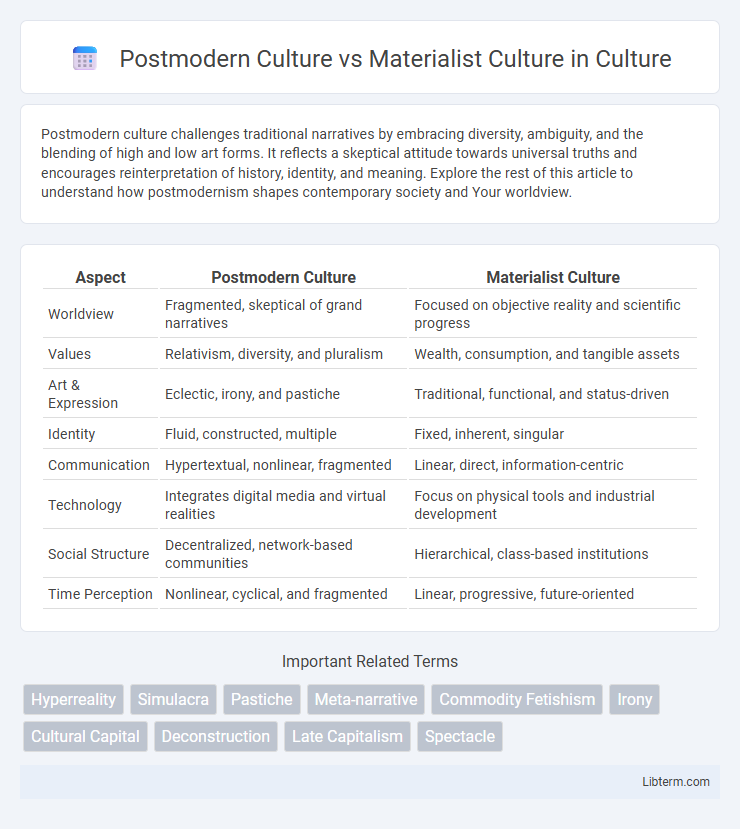Postmodern culture challenges traditional narratives by embracing diversity, ambiguity, and the blending of high and low art forms. It reflects a skeptical attitude towards universal truths and encourages reinterpretation of history, identity, and meaning. Explore the rest of this article to understand how postmodernism shapes contemporary society and Your worldview.
Table of Comparison
| Aspect | Postmodern Culture | Materialist Culture |
|---|---|---|
| Worldview | Fragmented, skeptical of grand narratives | Focused on objective reality and scientific progress |
| Values | Relativism, diversity, and pluralism | Wealth, consumption, and tangible assets |
| Art & Expression | Eclectic, irony, and pastiche | Traditional, functional, and status-driven |
| Identity | Fluid, constructed, multiple | Fixed, inherent, singular |
| Communication | Hypertextual, nonlinear, fragmented | Linear, direct, information-centric |
| Technology | Integrates digital media and virtual realities | Focus on physical tools and industrial development |
| Social Structure | Decentralized, network-based communities | Hierarchical, class-based institutions |
| Time Perception | Nonlinear, cyclical, and fragmented | Linear, progressive, future-oriented |
Defining Postmodern Culture
Postmodern culture challenges traditional narratives by emphasizing pluralism, fragmentation, and skepticism toward grand ideologies, contrasting sharply with materialist culture's focus on economic structures and class relations. It prioritizes symbolic meaning, media saturation, and consumer experiences over material conditions, reflecting a shift toward hyperreality and pastiche in art, literature, and social interaction. Key theorists like Jean Baudrillard and Fredric Jameson highlight postmodernism as a cultural logic marked by simulacra and the waning of historicity.
Understanding Materialist Culture
Materialist culture centers on the prioritization of physical possessions, wealth accumulation, and economic success as key components of identity and social status. This culture emphasizes tangible assets and consumerism as means to achieve personal fulfillment and societal recognition. Understanding materialist culture involves analyzing how economic factors influence behavior, values, and social interactions in contemporary societies.
Historical Origins and Development
Postmodern culture emerged in the mid-20th century as a response to the limitations of modernism, emphasizing skepticism toward grand narratives and embracing fragmentation, diversity, and irony. In contrast, materialist culture has roots in Enlightenment and Marxist theories, focusing on economic conditions, class relations, and the material basis of social life. The historical development of postmodernism reflects shifts in philosophy, art, and media following World War II, while materialist culture evolved through industrialization and capitalist economic systems.
Core Philosophies and Belief Systems
Postmodern culture challenges traditional materialist culture by rejecting objective truths and embracing relativism, emphasizing subjective experience and diverse perspectives. Materialist culture centers on economic progress, scientific rationality, and tangible reality as foundations for knowledge and social organization. Core postmodern philosophies prioritize deconstruction and skepticism of grand narratives, while materialist belief systems uphold empirical evidence and material conditions as primary determinants of truth and societal development.
Values: Pluralism vs Possession
Postmodern culture emphasizes pluralism, valuing diverse perspectives, identities, and experiences, fostering inclusivity and relativism in social, cultural, and ethical values. Materialist culture prioritizes possession, stressing material wealth, consumerism, and economic success as primary indicators of status and identity. The tension between these value systems reflects broader conflicts between collective social recognition and individual acquisition of tangible assets.
Art, Media, and Aesthetics
Postmodern culture challenges traditional materialist culture by emphasizing pastiche, fragmentation, and irony in art, media, and aesthetics, rejecting grand narratives and embracing pluralism. Unlike materialist culture's focus on production, ownership, and commodification, postmodern art blurs boundaries between high and low culture, prioritizing surface, simulacra, and intertextuality. Media in postmodern culture often highlights hyperreality and the collapse of distinctions between reality and representation, profoundly impacting contemporary aesthetic experiences.
Influence on Social Norms and Identity
Postmodern culture challenges traditional social norms by embracing pluralism, ambiguity, and the deconstruction of grand narratives, leading to fluid and fragmented identities. Materialist culture emphasizes consumption, commodification, and economic status as central to identity formation, reinforcing conformity to market-driven social norms. The interaction between these cultures creates tension between individual expression and societal pressures rooted in material success.
Economic Perspectives and Consumerism
Postmodern culture emphasizes symbolic consumption and identity construction, viewing consumer goods as expressions of lifestyle rather than mere necessities, which contrasts with materialist culture's focus on the accumulation of tangible wealth and possessions as indicators of economic success. Economic perspectives in postmodernism highlight decentralization and the fragmentation of markets, promoting niche consumer segments driven by experiential value, while materialist culture aligns with mass production and standardized consumer demand to maximize profit. Consumerism under postmodern culture critiques traditional capitalist values by prioritizing meaning and social signaling through products, diverging from materialist culture's emphasis on utility and status derived from ownership and economic capital.
Impact on Politics and Power Structures
Postmodern culture challenges traditional power structures by promoting fragmented identities and skepticism toward grand narratives, thereby decentralizing authority in political discourse. Materialist culture, grounded in economic determinism, emphasizes control over resources and production, reinforcing hierarchical structures within politics and power. The clash between these perspectives reshapes contemporary governance, with postmodernism advocating pluralism and materialism maintaining structural inequalities.
Contemporary Relevance and Future Trends
Postmodern culture emphasizes pluralism, irony, and skepticism toward grand narratives, reflecting contemporary society's diverse identities and fragmented media landscape. Materialist culture prioritizes consumption, wealth accumulation, and tangible assets, driving economic behaviors and social status in current global markets. Emerging trends suggest a hybridization where digital technologies blur boundaries between symbolic postmodern expressions and materialist-driven consumerism, influencing future cultural and economic paradigms.
Postmodern Culture Infographic

 libterm.com
libterm.com